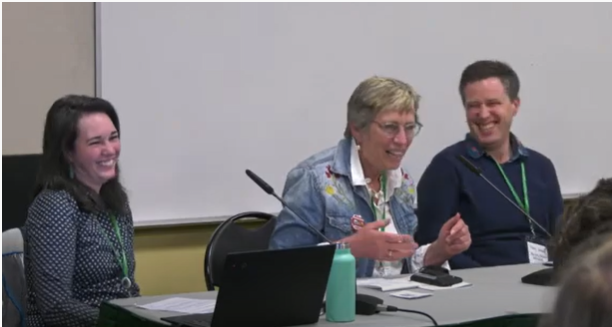This article is part of the series YIMBYtown 2022
The conversation shared below was part of the YIMBYtown 2022 conference, cohosted by Sightline Institute and Portland: Neighbors Welcome.*
It wouldn’t be YIMBYtown if we didn’t have at least one panel to talk about the high cost of free parking. The principles of Donald Shoup have never been more popular; advocates, elected officials, and policymakers are all looking at reform to car parking policies as an essential task to increase housing abundance, reduce carbon emissions, and just overall make cities more pleasant.
This panel features case studies and best practices of how municipal transportation and housing advocates have worked together to implement substantial overhauls on parking policy. Catie Gould from Sightline moderated the discussion:
- Mayor John Bauters of Emeryville, California, has repealed parking minimums and implemented the city’s first paid on-street parking program.
- Leah Bojo led the implementation of Austin, Texas’s, first parking benefits district and wrote about it in Donald Shoup’s 2018 book, Parking and the City. Now she consults for housing developers in negotiating zoning entitlements to allow for more housing for people instead of cars.
- Martha Roskowski, founder of Further Strategies in Boulder, Colorado, recently published a paper with insights from 40 parking experts titled “Ideas to Accelerate Parking Reform in the United States.”
- Tony Jordan, founder of Portlanders for Parking Reform, helped push Portland, Oregon, to repeal parking mandates and modernize curbside management. Now he is President of the Parking Reform Network, providing resources for policymakers and activists nationwide.
Related: Catch the highlights from this session in podcast version from Paul Barter’s Reinventing Parking, and read more from panelist Leah Bojo in Sightline’s Q&A: The Costs of Parking Mandates in Booming Austin.
*YIMBYtown 2022 occurred April 11–13 in Portland, Oregon, the fourth annual gathering (after some COVID delays) of “Yes in My Back Yard” (YIMBY) community leaders, organizers, planners, policymakers, educators, and housing providers eager to share resources and strategies for building more affordable, sustainable, and equitable communities.

